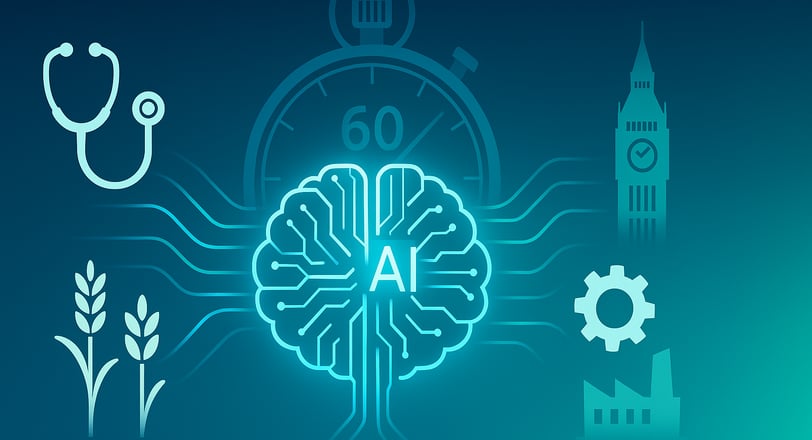How Can AI Agents Transform Your Business Operations in Under an Hour?
AI agents built with platforms like MindStudio can revolutionize business operations in under 60 minutes, as demonstrated by the UK Government's recent success. These tools enable rapid prototyping, eliminate lengthy procurement cycles, and deliver immediate value across industries from healthcare to agriculture, making enterprise AI accessible to organizations of any size.
ARTICLES
Simon Schoeman
6/7/20253 min read


How Can AI Agents Transform Your Business Operations in Under an Hour?
AI agents built with platforms like MindStudio can revolutionize business operations in under 60 minutes, as demonstrated by the UK Government's recent success. These tools enable rapid prototyping, eliminate lengthy procurement cycles, and deliver immediate value across industries from healthcare to agriculture, making enterprise AI accessible to organizations of any size.
The landscape of business AI has fundamentally shifted. What once required months of development and massive budgets can now be accomplished in a single afternoon. The recent collaboration between MindStudio and the UK Government's Incubator for Artificial Intelligence proves that even the most complex organizations can deploy working AI solutions at unprecedented speed.
What Makes Modern AI Agent Platforms So Powerful?
Modern AI agent platforms like MindStudio combine no-code development with enterprise-grade capabilities, allowing teams to build sophisticated automation without technical expertise. They offer both embedded solutions that integrate deeply with existing data systems and lightweight on-demand bots for immediate problem-solving.
The key differentiator lies in their accessibility. Unlike traditional AI development that requires specialized programming knowledge, these platforms democratize AI creation. Teams can:
Build prototypes in hours, not months
Deploy across multiple departments simultaneously
Scale from simple chatbots to complex data analysis tools
Integrate with existing business systems seamlessly
How Are Organizations Actually Using These AI Agents?
Organizations across diverse sectors are deploying AI agents for everything from customer service automation to complex data analysis. Successful implementations span IT providers, accounting firms, schools, healthcare departments, agribusinesses, and government agencies, each unlocking new levels of efficiency and innovation.
Real-world applications include:
Customer Support: 24/7 intelligent chatbots handling routine inquiries
Data Analysis: Automated report generation and trend identification
Process Automation: Streamlining repetitive administrative tasks
Decision Support: AI-powered recommendations for strategic planning
Training & Education: Personalized learning assistants for staff development
The versatility becomes clear when you consider that the same platform serving UK government departments also powers agricultural businesses in developing markets—proof that effective AI transcends industry boundaries.
What Should You Consider Before Implementing AI Agents?
Before implementing AI agents, evaluate your current data infrastructure, identify specific use cases with measurable outcomes, and ensure your team has basic digital literacy. Start with pilot projects that address clear pain points rather than attempting organization-wide transformation immediately.
Critical considerations include:
Data readiness: Ensure your information systems can integrate with AI tools
Staff training: Plan for user adoption and change management
Security protocols: Verify compliance with industry regulations
Success metrics: Define clear KPIs to measure AI impact
Scalability planning: Choose platforms that grow with your needs
The most successful implementations begin small, prove value quickly, then expand systematically across departments.
Why Is Speed of Implementation So Important?
Rapid AI implementation prevents analysis paralysis and delivers immediate competitive advantages while markets are still adapting to AI-powered business models. Organizations that deploy working prototypes in days rather than months can iterate faster, learn from real usage data, and establish market leadership before competitors catch up.
The "wait-and-see" approach that worked for previous technology waves is counterproductive with AI. Market dynamics change monthly, customer expectations evolve rapidly, and early adopters gain compounding advantages through:
Learning curve acceleration
Data collection head starts
Customer relationship strengthening
Process optimization refinement
Competitive differentiation establishment
FAQ
Can small businesses benefit from enterprise AI platforms?
Yes, modern AI platforms are designed for organizations of all sizes. Many offer scalable pricing and simplified interfaces that make enterprise-grade AI accessible to small teams with limited technical resources.
How long does it typically take to see ROI from AI agents?
Most organizations report measurable improvements within 30-60 days of deployment, with full ROI typically achieved within 6-12 months depending on implementation scope and use case complexity.
What happens if our AI agent makes mistakes?
Quality AI platforms include monitoring tools, feedback loops, and human oversight capabilities. Start with low-risk applications, implement approval workflows for critical decisions, and gradually expand as confidence grows.
Do we need technical staff to maintain AI agents?
While technical knowledge helps, modern platforms are designed for business users. Most maintenance involves updating training data and adjusting workflows rather than complex programming.
How do AI agents integrate with existing business software?
Leading platforms offer pre-built integrations with popular business tools (CRM, ERP, communication platforms) and APIs for custom connections. Integration complexity varies but is generally much simpler than traditional software implementations.
What industries see the biggest benefits from AI agents?
Customer service, healthcare, finance, education, and government sectors show particularly strong results, though virtually every industry can benefit from process automation and data analysis improvements.